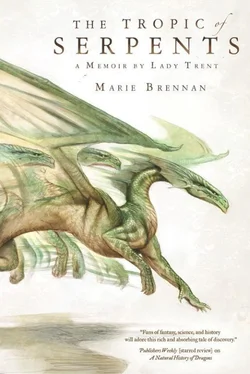I had studied the Yembe language (from a reference grammar, which is an abominable teaching tool), but it had in no way prepared me for the social language before me now. Staring out at the docks, I understood, for the first time, that I had left behind the familiar commonalities of Anthiope, and crossed the oceans to a different continent.
Mr. Wilker put his hand under my elbow, which tells me I must have reeled. “It will be a little while before we can go ashore,” he said. “You might want to go below until we do. The sun can be brutal, for those not used to it.”
Once he would have phrased it as “you should go below.” Disagreements over Natalie’s presence aside, we had indeed made great strides in our relationship with one another. “The sun does not bother me,” I said absently, digging in my satchel for my sketchbook. I’d done little drawing since leaving Scirland, the pitch and roll of the ship wreaking havoc on my ability to place a precise line, but I could not pass up this opportunity to sketch the docks.

I could feel him wrestling with the answer he wanted to make to that, before finally swallowing it—for the sake of harmony, I suspect. “I will make certain our trunks are being seen to,” he said, and went away.
I had only put the broadest outlines of the scene down on paper when a popping noise sounded behind me, and then my page was in shadow. “Natalie,” I said, annoyed.
“You’ll burn otherwise,” she said, all practicality as usual. “Grandpapa warned me. About the sun, and about you—that you wouldn’t take sufficient precautions.”
“The sun here is strong, yes. It was strong in the mountains of Vystrana, too, and I had little trouble there.” I had suffered more from dryness of skin than from sunburn.
Natalie laughed. “Yes, because you were cold all the time. You covered up and spent much of your time indoors to get away from the wind. But carry on with your work; this parasol is shading us both.”
I hadn’t needed her exhortation to continue. Line by line, the people were taking shape beneath my pencil, surrounded by crates and ropes and warehouses and shops, with little boats bobbing in the water at the lower edge of the scene. Drawing at speed was something I’d practiced these past few years; the images I produced lacked the polished elegance of my youthful art, but I’d improved greatly in my ability to capture the subject accurately in a short span of time.
By the time Mr. Wilker returned, I had enough of it down that I could fill in the remainder without trouble later on. “Is it very far to our hotel?” I asked, tucking my pencil away and closing my sketchbook. Certainly there would be other sights worth seeing beyond the docks, but I hoped to manage some individual portraits. Sailors the world over are a visually fascinating lot.
“Actually,” Mr. Wilker said, “it seems our plans may have changed. See that fellow at the corner there, beneath the yellow awning? The short one, with the band of gold around his forehead? He’s a messenger from the palace, sent to watch for our arrival. The oba has invited us to be his guests.”
I blinked at him in startlement. “At the palace? Surely not.”
“It seems so,” Mr. Wilker said. “And we’re expected to come straight on. The messenger brought horses, and he says we needn’t worry about our trunks.”
No doubt the gesture was intended to be helpful, but in my travel-frayed state, it struck me as faintly sinister. “What is this messenger’s name?”
“Faj Rawango,” Mr. Wilker said, with the careful air of one who doesn’t trust his tongue not to trip over the unfamiliar syllables. He too had studied the language, but Faj Rawango was not a Yembe name. Was the man a foreigner, or did he hail from one of the other peoples that made up the nation of Bayembe?
I didn’t realize Mr. Wilker and I had both fallen into a brief silence until Natalie broke it by saying, “Well, we cannot refuse such an honour.”
“No, of course not.” I replaced my sketchbook and drew the satchel up onto my shoulder. “And I suppose there isn’t much to be gained by delaying. Come, let us go meet this Faj Rawango.”
We descended to the ship’s longboat and were taken in to shore, disembarking on the salt-stained wood of the docks near where Faj Rawango stood. He was, as Mr. Wilker had spotted, a small fellow by the standards of those around him; in fact, he was a bit shorter than I. His skin, though still dark, was lighter and more reddish in tone than many of those around him.
Lacking a better option, I greeted him in the Yembe manner, touching my heart, and received the same in return. Natalie and Mr. Wilker echoed us both. But once the formal greetings were done—a rather lengthier process among the peoples of that region than among Scirlings—Faj Rawango spoke in our own tongue. “The oba regrets putting you to the trouble of a further journey, but you will rest in more comfort in the royal palace, in Atuyem.”
“That’s very kind of him,” Mr. Wilker said. “Our arrangements are for rooms in a hotel near Point Miriam. We had hoped to perhaps gain an introduction on some future date, but had no thought of imposing on his time and generosity so soon after our arrival.”
Faj Rawango dismissed this with a wave. “It is no imposition. He has met many Scirling merchants and soldiers, but no scholars. He is very curious about your work.”
The last time a foreigner with a title had taken an interest in our work, it had not ended well. That, more than anything in the messenger’s words, put apprehension in my heart. But what could we do? As Natalie said, we could not refuse this invitation. I cursed the politicking that preceded our journey. Necessary though it had been to procure our entrance to Nsebu, it had apparently drawn rather more of the oba’s attention than I wanted.
Our horses waited beneath a striped canopy not far away, in company with enough others that I understood the place to be some kind of waiting room for equines. Ours, however, stood out from the crowd, not only for their quality, but for the grandness of their equipage, beaded and gilt. No fewer than four soldiers stood watch over this wealth, who clearly would form our escort.
I call them soldiers, but at the time I had difficulty attaching the term to them, despite the Scirling rifles they bore. To my mind, a soldier was a man in uniform. I thought of these men instead as warriors, for their garb looked nothing like the uniforms I was accustomed to—stiff wool in solid colors—being drapes of cotton tied about their waists and dyed in some intricate pattern, with leopard skins hanging down their back like cloaks. Wool, I suppose, does little to protect one against a rifle ball or a cavalry sword, but such logic did not prevent me from fearing for the men’s bare and unprotected flesh.
As I turned to mount, I saw Natalie blushing. Until that moment, it had not even occurred to me, in more than an intellectual sense, that the men were half-naked. Then, unfortunately, I could think of nothing else. My own cheeks heated, and I fumbled my rise to the saddle, catching my shoe in the hem of my divided skirts. (My self-conscious embarrassment was somewhat mitigated by seeing Mr. Wilker a bit pink in the ears himself—likely more for ladies being exposed to such a thing than for his own sake, as gentlemen see one another bare in many contexts. We had all known this would happen, the climate of the region being what it is, but knowing and experiencing were separate things.)
To cover for my loss of composure, I questioned Faj Rawango as we rode out of the dockside district and through Nsebu proper. Or rather, that was my intention; it soon devolved into a polite argument wherein each of us tried to insist upon using the other’s native tongue, with the result that he spoke to me in Scirling and I responded in Yembe. Languages have never been my métier , so I fear he had the better of me in the comparison of skill, but my experience in Vystrana had taught me that there is nothing like using a language on a regular basis to better one’s skill. I therefore persevered until Faj Rawango bowed in the face of my stubbornness and began answering me in Yembe.
Читать дальше













